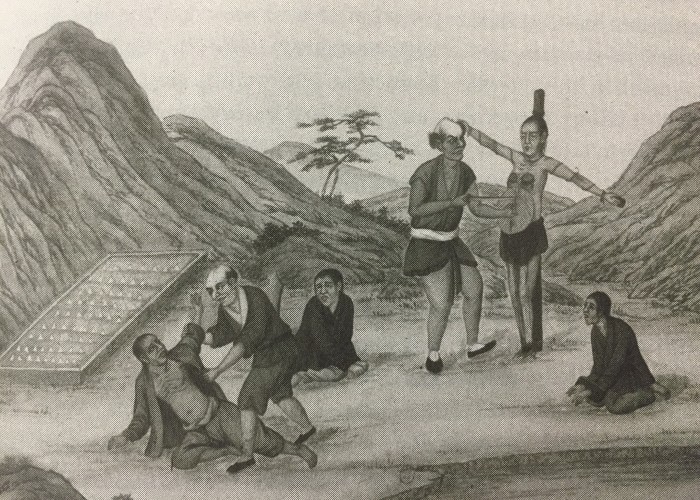Silence Is Meaningful
Ilan Stavans and Charles Hatfield
The following discussion of Paz and Borges as translators is part of the work-in-progress The Big Theft: Adventures of Translation in the Hispanic World, a series of conversations between Ilan Stavans, the Mexican essayist, translator, and editor and the Lewis-Sebring Professor in Latin American and Latino Culture at Amherst College, and Charles Hatfield, Associate Professor of Latin American Studies and Associate Director of the Center for Translation Studies at the University of Texas at Dallas.
* *
Charles Hatfield: I want to talk about Octavio Paz and Jorge Luis Borges as translators. Let’s start with one of the translations in Versiones y diversiones (1973/1978/1995), the volume that brought together Paz’s translations of poets ranging from William Carlos Williams and Hart Crane to Pierre Reverdy and Guillaume Apollinaire. One of Paz’s richest translations is of Elizabeth Bishop’s “A Summer’s Dream” (1948), and maybe we should begin by reflecting on what Paz wrote about Bishop in an essay from the late 1970s: “Poetry is not in what words say,” he wrote, “but in what is said between them, that which appears fleetingly in pauses and silences.” Of course, we know that the idea of silence was huge for Paz. You once characterized Paz’s translations of poets like Bishop and others as “personal versions” and “appropriations.” Is there something we can say about Paz’s translation of “A Summer’s Dream” in particular that might help us understand the nature of Paz’s appropriations better? Or should we begin by talking about Paz’s theories of poetic translation (you’ll recall that in his 1973 prologue to Versiones y diversiones, Paz wrote that his essay “Literatura y literalidad” contained his “teoría de la traducción poética,” or theory of translating poetry)?
Ilan Stavans: The relationship between the two is fascinating: he translated her, she translated him. In The FSG Book of Twentieth-Century Latin American Poetry (2011), I included some of her versions of his poetry (as well as numerous poems by Brazilian authors she translated). To what extent is the relationship between them symmetrical? Who is more respectful?
Ezra Pound believed that no one who isn’t a poet should dare to translate poetry. He is right and he is wrong. Right because only a poet is able to understand another poet. By understand I mean to know what the trade means, what concocting universes through bricks of words amounts to. And wrong because a poet might know too much, might be too close to “the real thing” to engage in the effort objectively. In the comparison, Bishop strikes me as a more respectful translator of Paz’s Spanish than Paz is of Bishop’s English. Take the penultimate stanza:
He was morose,
but she was cheerful.
The bedroom was cold,
the feather bed close.
Él siempre malhumorado,
aleluyas ella siempre.
Recámara congelada,
mullido lecho de plumas.
Paz eliminates almost all the verbs and articles. He introduces a staccato quality to the stanza. But do they say the same thing? My answer is a rotund no: “He was morose” doesn’t mean, by any stretch of the imagination, “Él siempre malhumorado.” And so on. As an exercise, let me retranslate—rather plainly—Paz’s translation back to English (without looking at her English):
He always in a bad mood,
she always in halleluiahs.
Frozen bedroom,
fluffy feather bed.
Paz’s silences are thefts. Or else, I could gently say that he doesn’t translate as much as he rewrites. The latter is a polite statement. But his rendition—let me not sugarcoat it—at its heart, verges on disrespect.
That’s why I’m always in favor of releasing poetry in translation with the original serving as companion.
CH: Bishop’s poem must have interested Paz in part because of its treatment of silence. The poem, of course, isn’t actually silent, but the people and things in it are: the “gentle storekeeper” is “asleep”; the “shrunken seamstress” doesn’t speak and only “smiled”; the “boarding house” is “streaked / as though it had been crying” (its streaks are silent residues of a sound from the past). The speaker declares that “we listened / for a horned owl,” but they don’t hear it. When we do get sound in the poem, it’s not really language—the “stammer” and “grumbling” of the “giant”; and when we get language, it’s not really sound—it comes in the form of the “old grammar” that the “giant” is poring over. In the last stanza, the speakers are awakened by the brook “dreaming audibly,” which Paz translates as “soñaba hablando en voz alta.” Paz’s translation seems to diminish the paradox of “dreaming audibly” by having the brook actually speak out loud while dreaming (“hablando en voz alta”).
What I’m getting at is this: what must have interested Paz about this poem in particular is its treatment of both silence and the paradoxes involved in representing it (in his poem “On Reading John Cage,” Paz wrote that “Music is not silence: / It is not saying / What silence says, / It is saying / What it doesn’t say”). But in his translation of Bishop’s “A Summer’s Dream,” Paz actually adds sound to the poem where there was none. For example, Bishop writes that “Every night we listened / for a horned owl,” and so the horned owl is expressed as a kind of silence in the poem—the speakers listen for it, but it is not heard. Yet in Paz’s translation, the speakers “escuchábamos gritar al búho cornudo,” meaning they actually “heard” (escuchábamos) the owl “shout” or “cry” (gritar). Whereas the owl is silent and absent in Bishop’s poem, it is screeching and audible in Paz’s. Another instance of this (not to belabor the point), is Paz’s choice of the verb “rezongar” to express Bishop’s “grumbling” of the giant, in which what is clearly not language in Bishop’s poem approaches language in Paz’s—“rezongar” can mean “grumbling,” but it can also mean “complaining.”
I love what you did with Paz’s translation of “she was cheerful” as “aleluyas ella siempre.” I was struck by your idea that Paz’s omissions of fundamental linguistic components of the sentence—the verbs—constitute both a silence and theft. He literally takes words, verbs no less, out of his Spanish version. Yet it’s also interesting to note that Paz actually adds sound. Being “cheerful” doesn’t imply any kind of sound at all: it’s just a state of being that can be expressed without any sounds. But even though the idea of the landlady as “always in halleluiahs” gets us the image of a pretty cheerful lady, the literal meaning is of someone who expresses her state of being through sound. So we end up with a perplexing situation in which Paz translates a poem that masterfully renders (and depends on) silence in a markedly not-silent way. In fact, Paz seems to convert silence into sound at virtually every turn. What can we make of this? I have to wonder if it gets us to the problems involved in thinking of silence as meaningful. As Paz put it in “On Reading John Cage,” “Silence has no sense, / sense has no silence,” which is one way of saying that as soon we see silences as meaningful, it’s hard to think of them as silences, or at least as what Paz calls “the nothing in between.”
IS: Paz at times is right on target. And his talents as a translator—or, at least, as a poet—are obvious and consistent. Let’s consider another Bishop poem translated by Paz: the gorgeous “Visits to St. Elizabeths,” which dates to 1950 and is loosely connected with her friend Robert Lowell’s life. In this case, Paz does an admirable job. Yes, there are liberties, maybe even abuses. But in the end he lands on solid ground.
For starters, notice the double plural in the original. Paz translates the title as “Visitas a St. Elizabeth,” the hospital name now in singular. Bishop, of course, is invoking her own name. But it isn’t easy to translate. Anyway, the poem begins:
This is the house of Bedlam.
This is the man
that lies in the house of Bedlam.
This is the time
of the tragic man
that lies in the house of Bedlam.
This is a wristwatch
telling the time
of the talkative man
that lies in the house of Bedlam.
This is a sailor
wearing the watch
that tells the time
of the honored man
that lies in the house of Bedlam.
The poem falsely mimics a children’s song built around repetition. Paz’s delivery of these first five stanzas goes:
Esta es la casa de los locos.
Este es el hombre
que está en la casa de los locos.
Este es el tiempo
del hombre trágico
que está en la casa de los locos.
Este es el reloj-pulsera
que da la hora
del hombre locuaz
que está en la casa de los locos.
Este es el marinero
que usa el reloj
que da la hora
del hombre tan celebrado
que está en la casa de los locos.
Bishop plays with an archaism: bedlam is used for lunatic. The route she takes is intriguing: Bethlem is a mental hospital, Bethlem Royal Hospital in London, from which the word bedlam came to mean madness. She turns it into a name: the house of Bedlam, that is, the house of madness. There are strange word choices (“tan celebrado” for “honored,” and so on). But the soar, the biggest challenge is Bishop’s “house of Bedlam,” where she uses uppercase B to refer to the place. Is Paz creative? In this case, I believe he is, for I see no other way out.
In the last stanza, Bishop writes:
This is the soldier home from the war.
These are the years and the walls and the door
that shut on a boy that pats the floor
to see if the world is round or flat.
This is a Jew in a newspaper hat
that dances carefully down the ward,
walking the plank of a coffin board
with the crazy sailor
that shows his watch
that tells the time
of the wretched man
that lies in the house of Bedlam.
In Paz’s rendition:
Este es el soldado que vuelve de la guerra.
Estos son los años y los muros y la puerta
que se cierra sobre un muchacho que golpea el piso
para saber si el mundo es plano o redondo.
Este es el judío con un gorro de papel periódico
que baila con cuidado por el dormitorio
caminando sobre la tabla de un ataúd
con el marinero chiflado
que muestra el reloj
que da la hora
del desdichado
que está en la casa de los locos.
Frankly, the rendition is admirable: one needs the liberties Paz takes in order to make the poem tick in Spanish.
CH: Let’s now turn to Borges. Elsewhere we have discussed in depth some of his strategies as a translator. Now I want to focus on some of the mysteries and polemics surrounding his translation of William Faulkner’s The Wild Palms. Douglas Day wrote a great essay called “Borges, Faulkner, and The Wild Palms,” which I will always be grateful to if only for having brought to my attention Alan Tate’s description of Faulkner as a “Dixie Gongorist.” Day’s essay settles an important point: it’s often said that Borges sanitized Faulkner’s text, when in fact, as Day points out, Borges was merely basing his translation on an already sanitized British edition of the novel published by Chatto and Windus in London.
We don’t need to get into all the intricacies in Day’s argument beyond the following: Borges, Day points out, wrote reviews of Absalom! Absalom!, The Unvanquished, and The Wild Palms in the journal El Hogar during the late 1930s, and while he had high praise for Absalom and The Unvanquished, he wrote that in The Wild Palms, Faulkner’s “technical novelties” seemed “less attractive than bothersome, less justifiable than exasperating.” In the end, Borges concluded that the novel wouldn’t be a good introduction to Faulkner’s writing. So why did he translate it? The reasons, Day suggests, are banal, having to do more with rights and contracts than with Borges’s own tastes and values. But the more interesting question has to do with why, years later, Borges seemed to attribute the translation to his mother. Day’s answer is that he did so because his translation of The Wild Palms came at a time in Borges’s career when he was turning away “from the psychological experimentalism and brutal (one is tempted to say ‘messy’) content of a William Faulkner and turned to a form which for him rendered the novel redundant and irrelevant: Ficciones.”
As to the translation itself, Day called it “very good.” There’s been a good deal of debate surrounding Borges’s translation of The Wild Palms. Whereas, for example, Day argues that The Wild Palms represented just the kind of fiction writing Borges was getting away from in Ficciones, Earl and Ezra Fitz argue just the opposite: Las palmeras salvajes, they say, “should be read in conjunction with ‘Pierre Menard, Author of the Quixote’ as a crucial part of Borges’s narrative revolution, one that depends on the reader’s role in the creative process and on the innumerable ways the act of translation makes manifest this then audacious theory.” I recently came across a useful account of different assessments of Borges’s translation in Gareth Wood’s book on Javier Marías and translation. One is by Marías himself, who wrote that Borges translated Faulkner “bastante mal,” adding that it was not “por sus argentinismos, sino por su conocimiento imperfecto del inglés” and also, more interestingly, because of his “falta de aliento novelístico.” Then there’s Piglia’s claim that “lo que uno encuentra en esa traducción es una lucha entre el estilo de Borges y el estilo de Faulkner.”
Wood looks carefully at Borges’s translation and uncovers interesting renderings, such as, for example, when Borges translates “You’re mad because he used a scalpel without having a diploma” as “Te has enloquecido porque ha usado un bisturí sin tener diploma,” mistaking mad meaning “angry” for mad meaning “crazy.” The other assessment of Borges’s translation that Wood discusses is by Juan Benet, who wrote in reference to Borges’s edition that “me veo obligado a transcribir las citas del texto traducido por Borges, por carecer de otra edición.” Wood himself calls parts of the translation—and the dialogue in particular—“flat and staid, attempting none of the verbal idiosyncracies of popular speech.”
I recently had the pleasure of reading your essay “Beyond Translation: Borges and Faulkner,” which ends with a detailed analysis of Borges’s translation of “The Wild Palms.” You suggest that Borges’s ars poetica of translation comes in four parts—his story “Pierre Menard, Author of the Quixote,” his essays “On Vathek, by William Beckford” and “The Translators of the 1001 Nights,” and finally his own translation of Faulkner’s The Wild Palms. You note that “the resemblance—in syntax, in spirit—is startling” between the two texts, and you go on to argue that if it can be said there are two approaches to translation (one in which the translator “disappears,” and another in which “the translator endlessly stresses the artificiality of his endeavor”), Borges comes down on the side of the former. In his translation of The Wild Palms, Borges is “behind Faulkner, not in front or at his side.” Maybe we can continue our discussion of Borges’s translation of Faulkner, which raises a lot of questions and promises to be a long discussion, by asking you to revisit some of your claims.
IS: I’m glad you’ve found the essay provocative. Translation is a cornerstone in his oeuvre. Menardismo, as you know, has even become an ideology, just as Quixotismo is. Borges translated lots of texts throughout his career. He started quite young, with Oscar Wilde. The translation was for a time mistakenly credited to his father. He also translated Virginia Woolf, for whom he had little patience as reader. In Buenos Aires magazines, he translated ghost stories, essays by G. K. Chesterton and Poe, and other stuff. As for Faulkner, he loved him, as did Onetti and García Márquez: because his Deep South was much like Latin America, a region scarred by history. Except that Borges didn’t seek to rewrite Yoknapatawpha County; he simply savors it as a reader.
Reading and translating are one and the same thing, for Borges and for myself. In his essay on Beckford, he says that the original can be untruthful to the translation. And in his meditation on 1001 Nights, he argues that translators have taken liberties that have gone beyond the semantic level, sometimes introducing entirely new characters, as in the case of Sinbad.
Nabokov, in rendering Pushkin’s Eugene Onegin into English, makes his version baroque, artificial. He abuses the footnote. His one-time friend Edmund Wilson attacked this Pushkin version rather viciously in the pages of the newly created New York Review of Books. Borges cannot escape his own semantics; he translates using adjectives the way only Borges would use them. (Remember the opening of “The Circular Ruins”: “Nadie lo vio desembarcar en la unánime noche.”) But he has no intention of upstaging Faulkner, at least not overtly.
CH: What fascinates me most in the end is the attention that Borges’s translation of The Wild Palms has generated. It sounds like a weird question, but why do we care so much about Borges’s Las palmeras salvajes? It can’t only be, I think, because the text was largely responsible for introducing generations of Latin American writers to Faulkner, nor can it only be because we all love Borges and thus we naturally are fascinated by his translations. In other words, I wonder if there’s some anxiety getting worked out through all of this—an old anxiety about the “originality” of the Latin American novel, or about what it would mean if el gran Borges just did the translation (as Day sort of implies) for the cash, or about translation as an activity writ large. It might not be an entirely useful question, but I do wonder what we’re all really trying to work out when we argue that Borges did it well or did it badly or made it his own or didn’t make it his own or theorized through doing it, etc. What do you think?
IS: Thank you for the intriguing context you’ve provided, which offers a more complete picture than the one I had when I wrote my essay on Borges and Faulkner. First, let me endorse the serendipitous argument. Biography is always written in hindsight, through the rearview mirror. Yet life is never lived that way: it’s always unpredictable, arbitrary, even chaotic. Borges was a master in the art of curating his own career. When we look at it, it seems consistent, coherent, straightforward to a degree that, frankly, is suspicious. We all take detours, don’t we? We all get lost. We embark on projects that become dead ends. Of course, a convincing career is always measured by the thread uniting the successful projects. Yet what happens with those that ended up in the dumpster? That Borges probably did the job for money seems too pedestrian, like when I was hired to write a how-to book for the Smithsonian: I needed money to pay for my first child’s diapers, plain and simple.
Generally speaking, I’m not a fan of Piglia; but I like Piglia’s description of Borges’s translation of Las palmeras salvajes as a boxing ring. Borges’s false starts are fascinating. His incapacity to let Faulkner’s style breathe is symptomatic of his own overwhelming barroquismo. Why is this rendition so controversial? I think you may have hit the nail on the head. Faulkner will end up becoming the patron saint for Rulfo, Onetti, García Márquez, and others, the father of the fractured, experimental novel. Yet Borges, at this point, is already dissing the novel as a literary genre. He finds it exhausting, too malleable. He ridicules Dostoyevsky’s Crime and Punishment for convincing the reader that a heinous crime is worth committing for moral reasons. Plus, this comes at a time when translation is increasingly taken seriously in Latin America. Many intellectuals embrace it as a worthy endeavor. And finally: almost every translation by Borges has generated rivers of ink; therein his role as the Moses of literary translation in the Spanish-language Americas. The Faulkner case is emblematic, but so is his fragmentary version of Leaves of Grass, for instance.
* *
Image: “Autopistas” (Highways) by Max Murad
[ + bar ]
Pilgrims Book House [kathmandu]
The fire began surreptitiously, away from the bar’s carousing punters, but soon crept into the kitchen. There it licked at the piled gas cylinders, unleashing a conflagration of such... Read More »
I’ve Lost Everything I Loved (excerpt)
from J’ai perdu tout ce que j’aimais by Sacha Sperling translated by Addie Leak
I had decided that my name would be Sacha Sperling and... Read More »
The Forgotten Sense (fragment)
Pablo Maurette translated by Andrea Rosenberg
In the winter of 1904–1905, in Beijing, a bodyguard named Fuzhuli was accused of killing his master, a Mongol prince, with... Read More »
Lions
Iosi Havilio translated by Andrea Rosenberg
And in the middle of the day came the night . . . Down the hill, all made of shadows, the Protagonist... Read More »

![Pilgrims Book House [kathmandu]](http://www.buenosairesreview.org/wp-content/uploads/IMG_0085-700x500.jpg)






 sending...
sending...